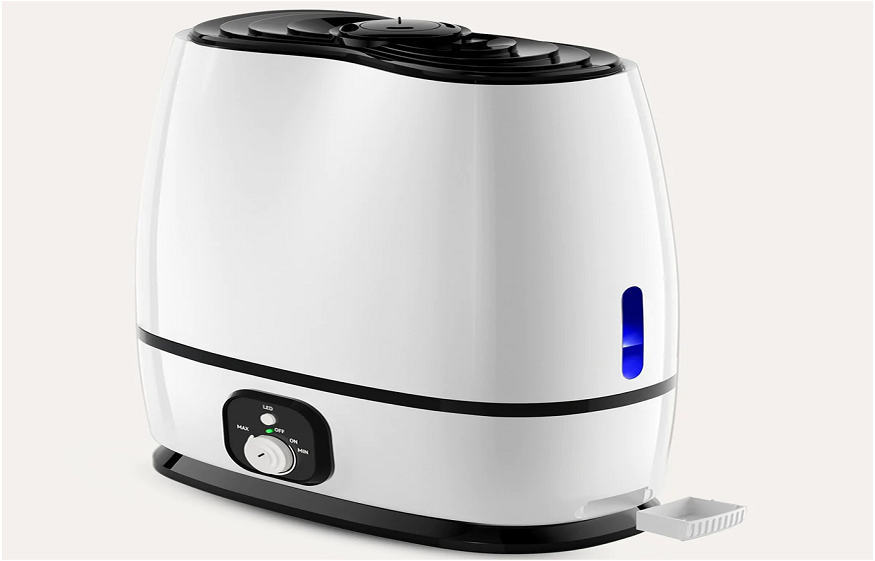If you have ever woken up after a long night’s sleep only to feel like you just spent the last 12 hours in the desert, you are not alone. While humidifiers are by no means new to the market, they may be the missing link between you and a great night’s sleep. In the 1960s, Raymond Banks was the original inventor of the indoor humidifier. While the original designs were far from the small, compact versions we see now, the essential components of the humidifier remain the same as they did when first invented.
Humidifiers use vibrations to produce a cool mist, adding humidity to your room. The pulses allow water droplets to form and lift into the air, creating a cool fog. This moisture increases the humidity levels in the air by releasing water vapor or steam. While humidifiers are not meant to clean the air, they can purify it with added humidity.
Setting up your humidifier is an easy task anyone can take on. In order to ensure that your humidifier will continually put out the cool fog for as long as you would like it to, be sure to fill the basin that came with your humidifier. While some people have not quite jumped on the humidifier bandwagon, our list of reasons why you have to get a humidifier may surprise you.
Clear Up Congestion
Generally, waking up with congestion should never be a sign of concern, especially since more than 50 million Americans suffer from some type of allergy annually, making allergies the sixth leading cause of chronic illness. If you wake up with congestion, have difficulty breathing at night, or just feel congested throughout your day, it may be time to invest in a humidifier. Your nasal passages can dry out, whether it is dry outside or you are pumping in hot, dry air during the winter. This is especially true for individuals with a respiratory condition or asthma. A humidifier is an easy, drug-free way to get some relief night after night.
Moisturize Skin
Dry skin is something no one wants to tolerate. The skin begins to feel tight, itchy, scaly, and flakey and can cause fine lines or cracks. Dry skin occurs when moisture or oils are not getting to the skin. The skin requires moisture or oil to properly maintain itself and stay healthy, which is no surprise considering 50-60 percent of the human body is made out of water. While several medical conditions can cause dry skin, including eczema, dehydration, and diabetes, they can also result from dry air pulling moisture from your skin. The best way to counteract the dry air is by increasing the amount of moisture in the air. This extra humidity can help give you a fresh glow and provide much-needed relief. Humidifiers are easy to nourish your skin – just plug them in while asleep and let your skin take it from there!
Stop Snoring
We all have that one person in our life who snores. An estimated 45 percent of adults occasionally snore, while 25 percent snore regularly. Those most likely to snore include individuals who are overweight, drink alcohol, middle-aged or older men, and post-menopausal women. Snoring can be highly disruptive to our natural sleep cycles. Instead of trying bulky machines or taking precipitation medication, give a humidifier a try first! Humidifiers can help reduce snoring by loosening the mucus that blocks the airway. The more your airway is open, the less you will snore.
Protect Your Wood Furniture
The best thing you can do to show some love to your home is to maintain a constant humidity level inside of the home. Humidifiers are also a must-have if you have wood floors or furniture. Dry air is no friend to natural woods and can cause extreme damage by drying out the wood, which leads to cracking. Damage can also include swelling of wood doors, which makes them difficult to open or close, loosening of the joints in wood floors, and giving wood furniture an overall dull appearance.
While setting up and using a humidifier is extremely easy and can produce some fabulous results, it is equally important to take proper care of your humidifier to keep it in good working order. Humidifiers should be deep cleaned weekly. Stagnant water can produce bacteria, which, if left in the humidifier to run, can result in bacteria being sprayed into the air, not just the water particles. All you need to clean your humidifier is distilled white vinegar or liquid bleach and a toothbrush. This will ensure your humidifier is running smoothly and spraying only clean, healthy air particles.
When used and cleaned correctly, humidifiers can significantly affect your life – from your breathing to your sleeping. Everyone should have a humidifier in their home as that’s your best bet for improving indoor air quality.
You may also like
-
Air Filter Specifications: How To Spot A Top-Quality Air Purifier
-
The Ultimate Guide To HardHats: Safety, Selection, and Compliance
-
Affordable Art for your Home
-
Revolutionising Clean Water: The Role of RO Technology in a Water Purifier
-
Understanding Inverter Generators: Powering Your Needs Efficiently

